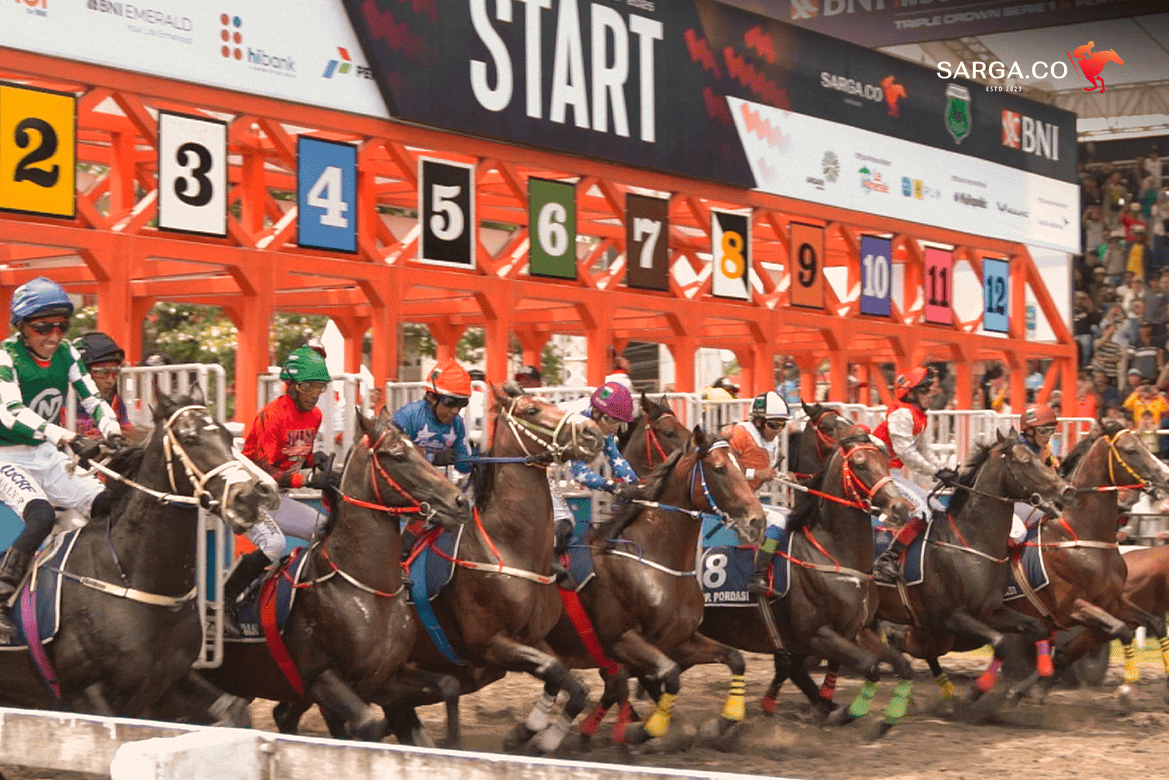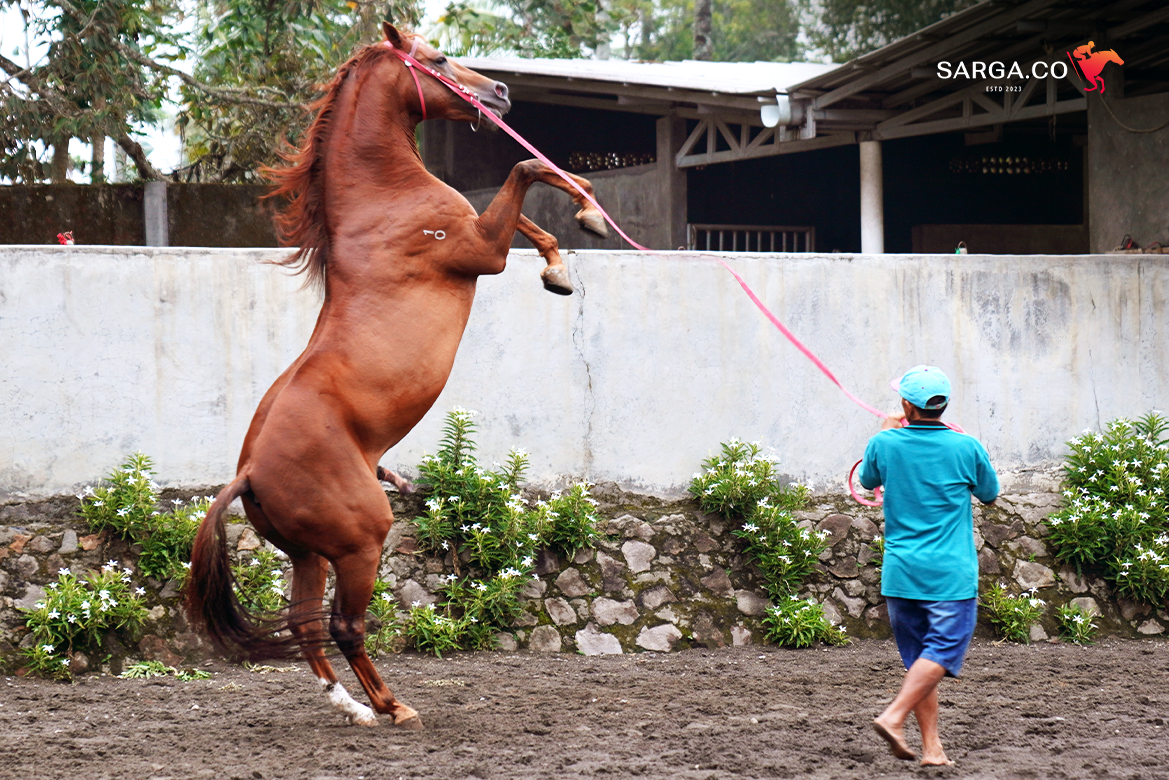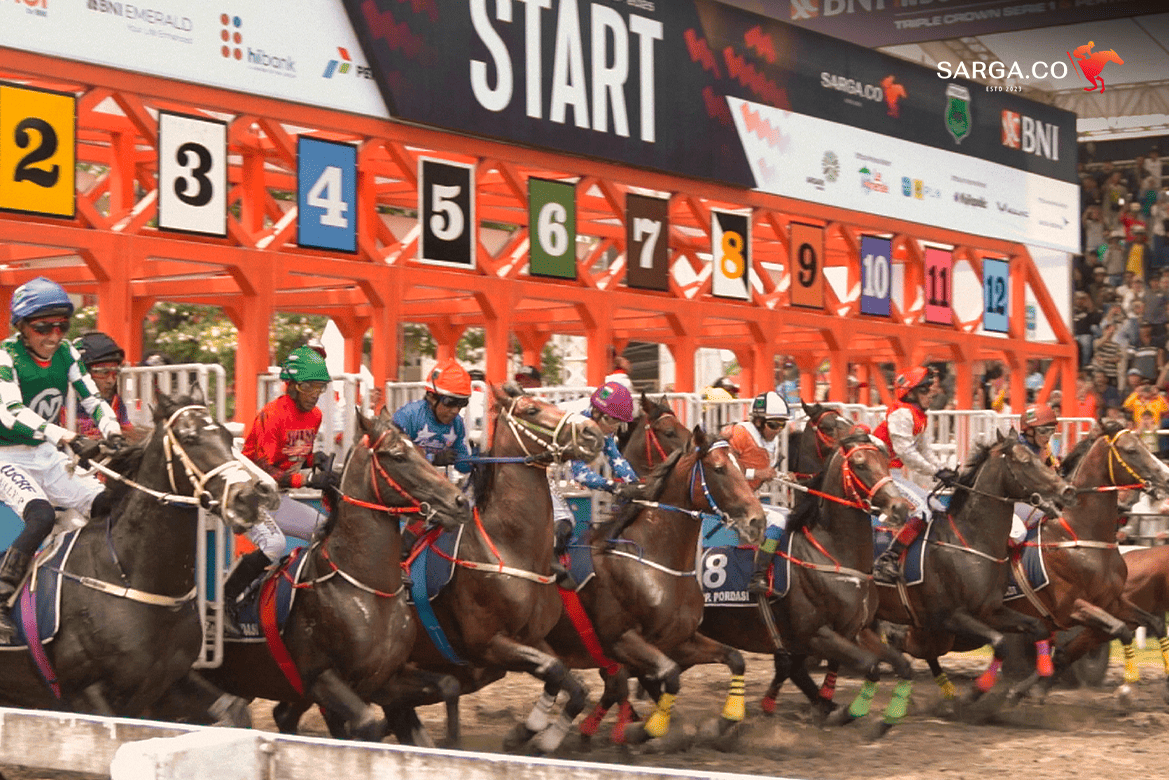SARGA.CO—Behind the roar of the racetrack, silent moments hold more tension than the crowd’s loudest cheers. One such moment happened during the Class A Sprint, when the star horse, Dominator, trained by Ardhi Punta Wijaya, was preparing to enter the gate. But his leading jockey, Esra Tesa Tamunu, made a shocking decision—he stepped down.
Everything changed. His body gave out. Tesa returned to his post and admitted he was not physically fit to compete that day.
Coach Ardhi stood frozen. Strategies that had been meticulously prepared had to be scrapped in seconds. Dominator dh. King Talago, owned by Ciello Stable, is no ordinary horse—he’s a former PON champion, known for his explosive energy and power.
It would take a jockey who wasn’t just strong and sensitive to the horse’s temperament. Within minutes, Ardhi had to make a decision—not just to save the race, but also to protect the reputation of his stable. The SARGA.CO team interviewed three key figures in this incident: substitute jockey Joshua Rori, trainer Ardhi Punta Wijaya, and Chief Steward H. Katompo.
From their accounts, a picture emerges of the intense dynamics behind a decision made in less than 40 minutes.
Joshua Rori’s name came up. A freelance jockey with a solid reputation, seasoned experience, and—most importantly—one remaining race slot out of the six allowed in a single race day.
This six-race limit is a regulation set by the stewards to prevent jockeys from becoming overly fatigued, which could increase the risk of accidents on the track.

Ardhi Punta Wijaya, Trainer
Source: SARGA.CO
Without much formal discussion, Ardhi approached Joshua in the jockeys’ room. “Jok, can you take Dominator?” he asked, his voice half hopeful and half anxious. Joshua looked at him briefly and replied, “I’m ready, coach.”
Behind that calm response, Joshua’s heart raced. He knew this wasn’t just any race. This was a high-caliber horse, trained directly by a top-tier coach.
He didn’t know Dominator well. He had never ridden him before. But there were only a few minutes left, and Ardhi’s trust in him pushed Joshua to leap.
He went to Tesa. There was no ego between them. Joshua humbly asked for insights about the horse’s character and how to handle him. The rest came from Ardhi’s rapid briefing. “I had to ask carefully. This isn’t practice—this is the actual race,” Joshua recalled in the interview with SARGA.CO.
Yet one hurdle remained before he could mount: steward approval. Chief Steward Katompo reviewed the records. Joshua’s weight needed to fall between 49 and 54 kg—standards regulated by the Indonesian Equestrian Sports Association (PORDASI) in Chapter VII Article 1 Point 5. If a jockey’s weight is under the requirement, the official weighing judge decides whether to add weight.
Chapter I, Point 12 also states that a jockey’s load includes body weight, saddle, and gear, all of which are determined by the race’s governing body.
Once all requirements were met, Katompo confirmed that Joshua still had one race slot available—he had only ridden five horses that day.
“You’re clear to ride,” said Katompo firmly. In moments of chaos, stewards serve as anchors to ensure the race proceeds by the book. “We never complicate things. As long as it’s within regulations and fair, we give the green light,” Katompo added.

Jockey Joshua Rori rides the horse Dominator in the A Sprint class
Source: SARGA.CO
Joshua geared up. He mounted Dominator, fully aware of the heavy responsibility he now carried. The starting gate opened.
The first few seconds would stay with Joshua forever. He sensed something was off even before the start. And he was right—just after launch, there was a jolt. Dominator lurched. Joshua was thrown violently to the ground. His shoulder and leg were trampled.
He was rushed to the medical post. But pain wasn’t his first concern—responsibility was. “I still have three more horses today. If possible, give me a painkiller shot so I can continue,” he told the nurse.
But the body doesn’t lie. Joshua had to give up his remaining races, passing the reins to another jockey. He wasn’t disappointed because he lost—he was devastated because he couldn’t fulfill the trust placed in him.
For Ardhi, the incident was another blow. After building strategies for four horses—Megantara, Stefani, Arbok, and Dominator—everything fell apart within minutes. He admitted he faltered and even lost focus in the following races. “I had everything prepared, but it crumbled in minutes,” he said.
As a trainer, pressure comes from all directions. Owners demand results. Time keeps ticking. A substitute jockey must be chosen instantly, briefed in seconds, and expected to bond with the horse as if they’d trained together for months.
Ardhi still tried his best. He chose Joshua because he believed in him. But he knew this wasn’t about right or wrong but about risk.
“I know the jockey isn’t mine. I’m just borrowing. So I can’t be too harsh if mistakes happen,” he admitted honestly.
After the incident, the stewards rechecked saddle positions, gate release mechanisms, and the horse’s condition. No violations were found. But something still didn’t sit right with Ardhi. He suspected human error at the gate, and that question remains unanswered.
That day, there was no podium finish for Dominator. But there was a story far greater than winning or losing—about how a single race became a test of professionalism, courage, and the weight of trust.
It’s not just horses that must be ready to run in horse racing. Trainers, jockeys, and the system behind them must be prepared to face the fastest decisions, with the highest stakes.




